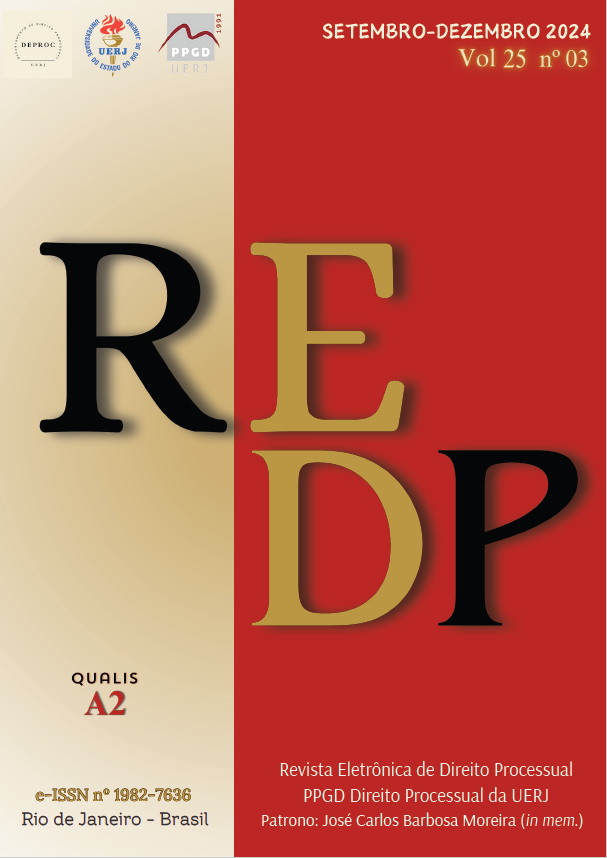DIREITO À MORADIA EM REPERCUSSÃO GERAL: A DISCUSSÃO SOBRE A PENHORA DO BEM DE FAMÍLIA DO FIADOR EM CONTRATO LOCATÍCIO COMERCIAL NA JURISPRUDÊNCIA DO SUPREMO TRIBUNAL FEDERAL
DOI:
https://doi.org/10.12957/redp.2024.86627Resumo
É possível, à luz da Constituição e da legislação processual, estabelecer limites para a penhora do bem de família em dívida decorrente de fiança concedida em contrato de locação? Tradicionalmente, o Supremo Tribunal Federal (STF) tem, ao longo dos anos, reafirmado a predominância da tese em favor da penhorabilidade de bem de família de fiador em contrato de locação em detrimento do direito fundamental à moradia. Este artigo pretende analisar empírica e qualitativamente a decisão colegiada proferida no Recurso Extraordinário Nº 1.307.334/SP, através de um estudo de caso, com o propósito de compreender os motivos que influenciaram no processo decisório do Supremo Tribunal Federal. Em sede de conclusão, identificou-se que o Plenário voltou a analisar a mesma matéria em razão de uma distinção entre a natureza da locação – residencial x comercial – que não fora tema de discussão na jurisprudência clássica, fixando-se novo entendimento, porém em precedente sem natureza vinculante. No julgamento mais recente, foi reafirmado o entendimento sobre a constitucionalidade da penhora do bem de família pertencente ao fiador de contrato locatício independentemente de sua natureza (residencial ou comercial), notadamente porque a norma infraconstitucional não só prevê a excepcionalidade à impenhorabilidade do bem neste caso, como também não distingue, por questões de isonomia, o fiador seja o contrato residencial, seja comercial.
Downloads
Publicado
Como Citar
Edição
Seção
Licença
Copyright (c) 2024 Renan Francelino da Silva, José Mário Gomes Wanderley Neto, Alexandre de Paula Filho

Este trabalho está licenciado sob uma licença Creative Commons Attribution 4.0 International License.
Todos os artigos publicados na Revista Eletrônica de Direito Processual (REDP) (Departamento de Direito Processual, Universidade do Estado do Rio de Janeiro, Brasil) são licenciados por meio de uma Licença Creative Commons - Atribuição 4.0 Internacional (CC BY 4.0).
Os autores retêm os direitos autorais de seu artigo e concordam em licenciar seu trabalho com a licença CC BY 4.0, aceitando assim os termos e condições específicos desta licença disponíveis no seguinte website: https://creativecommons.org/licenses/by/4.0/legalcode.
- Os autores concedem à REDP o direito de primeira publicação, de se identificar como publicadora original do trabalho e concedem à revista uma licença de direitos não exclusivos para utilizar o trabalho das seguintes formas: Reproduzir, vender e distribuir cópias eletrônicas ou impressas do manuscrito como um todo, de partes específicas do manuscrito e de suas traduções para qualquer idioma;
- O uso do artigo por terceiros é livre, contanto que a integridade da publicação seja mantida e seus autores originais, periódico de primeira publicação e detalhes de citação sejam identificados.
Dentro dos termos da licença, os autores podem entrar em acordos contratuais adicionais separados para a distribuição não exclusiva da versão publicada do trabalho na revista.
Copyright and Licensing
All articles published in the Procedural Law Electronic Review (REDP) (Department of Procedural Law, State University of Rio de Janeiro, Brazil) are licensed under a Creative Commons License - Attribution 4.0 International (CC BY 4.0).
- Authors retain copyright to their article and agree to license their work under the CC BY 4.0 license, thereby accepting the specific terms and conditions of this license available at the following website: https://creativecommons.org/licenses/by/4.0/ legal code.
- Authors grant REDP the right of first publication, to identify itself as the original publisher of the work, and grant the journal a non-exclusive license to use the work in the following ways: Reproduce, sell and distribute electronic or printed copies of the manuscript as a whole, of specific parts of the manuscript and its translations into any language;
- Use of the article by third parties is free, as long as the integrity of the publication is maintained and its original authors, first publication journal, and citation details are identified.
Within the terms of the license, authors may enter into separate additional contractual agreements for the non-exclusive distribution of the published version of the work in the journal.




